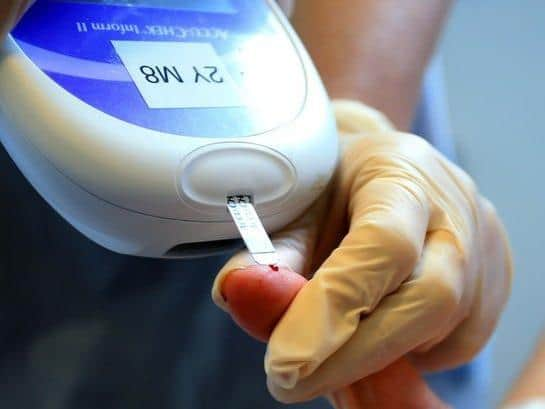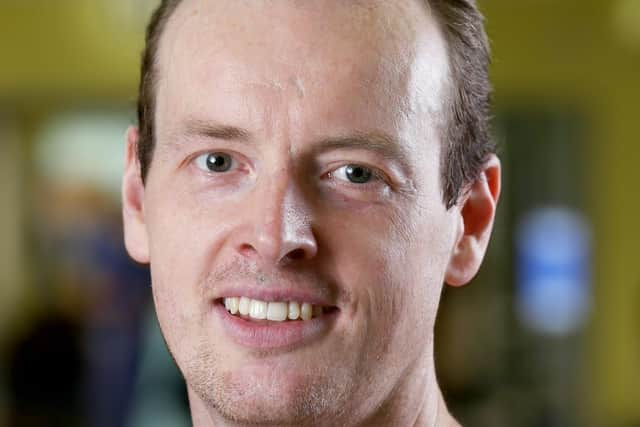The University of Bradford in fight to tackle the big diabetes problem in the city
Despite having one of the youngest populations in the UK, Bradford has the highest ratio of diabetes, according to experts.
Figures showed 10.81 per cent of people in Bradford, 12,116 residents, were diagnosed with diabetes compared to 6.9 per cent of the wider population across the UK, according to Diabetes UK, in results revealed in 2020.
Advertisement
Hide AdAdvertisement
Hide Ad

Last year The Yorkshire Post also revealed in a special health inequalities report last year that the prevalence of obesity, which can contribute to diabetes, in Yorkshire and the Humber since 2015 is increasing much faster than the English average, with the much higher rates of obesity including in Bradford City, and Bradford District.
Dr Séamus O’Neill, chief executive of the Northern Health Science Alliance, stressed the need for the pandemic to be a “watershed moment” in creating the social and political will to build a society that values everyone’s health now and in the long term.
“For years there has been rhetoric in Government about tackling health inequalities. It’s time that the action matches the rhetoric,” he told The Yorkshire Post.
Now the University of Bradford aims to create new approaches to tackling the endemic problem when they host an health event on May 25, led by the institute’s Digital Health Enterprise Zone (DHEZ).
Advertisement
Hide AdAdvertisement
Hide Ad

Involved in the event is Dr Tom Lawton, an Intensive Care Consultant (ICU) and anaesthetist at Bradford Teaching Hospitals NHS Foundation Trust, who is working closely with the University of Bradford on diabetes health related studies.
Dr Lawton, who received an MBE for going above and beyond during the pandemic, stressed the importance of the event due to the crippling complications associated with Type-2 diabetes.
He said: "Despite a young population, Bradford has the highest prevalence of Type-2 diabetes in the UK. It carries many complications, which have often already started by the point of diagnosis, leading to disability, financial costs, and mortality."
Dr Lawton added the Covid-19 pandemic has highlighted the need for "attention on this disease" due to people with diabetes being twice as likely to die from Covid-19 as the general population.
Advertisement
Hide AdAdvertisement
Hide Ad

He added: "However, in Bradford exists the expertise, whole-systems thinking, and will to research and improve this - and I believe that joined-up digital health has a massive role to play."
The landmark event will build on research activity within the University of Bradford aimed at advancing diabetes diagnosis, treatment, and support for patients, carers and extended families.
The event will also showcase the work of Dr Kirsten Riches-Suman from the Faculty of Life Sciences.
Her research is focused on understanding why people with Type-2 diabetes suffer from problems with their blood vessels which can cause conditions including heart disease and difficulties in repairing the skin after an injury.
Advertisement
Hide AdAdvertisement
Hide Ad

Dr Riches-Suman works with surgeons at the Bradford Royal Infirmary to see what makes diabetes patients' cells and tissue different at the microscopic level to identify more effective treatments for them.
She said: "In order to help make new treatments for the complications of diabetes, we first need to understand what tiny chemical changes happen in blood vessels which stops them working properly.
"My team has identified problems with inflammation and DNA damage which can open up opportunities for the development of new medicines to improve cardiovascular and skin health, and ultimately quality of life.”
The aim of the event will be to identify research agendas that can be followed up as collaborative projects and funding bid opportunities.
Advertisement
Hide AdAdvertisement
Hide AdDr Liz Breen the director for DHEZ and a Reader in Health Service Operations at the University of Bradford, said: “This event will...try to ascertain what diabetes diagnosis and care will look like in 10 years, and ask how we prepare our healthcare system for this.
"Diabetes has been specifically chosen because of its importance within our community."
__________
Support The Yorkshire Post and become a subscriber today.
Your subscription will help us to continue to bring quality news to the people of Yorkshire. In return, you'll see fewer ads on site, get free access to our app and receive exclusive members-only offers. Click here to subscribe.